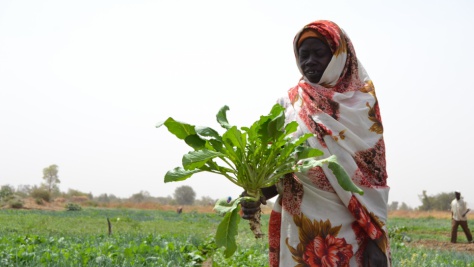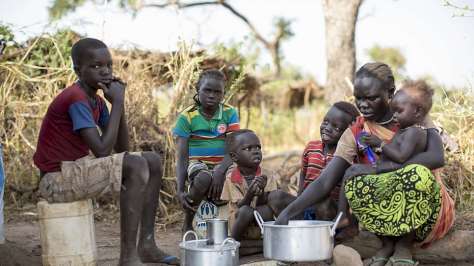 © UNHCR |
Sudan has a longstanding tradition of hospitality towards refugees and asylum-seekers, with more than 150,000 refugees and asylum-seekers currently hosted in eastern Sudan, Darfur and Khartoum.
South Sudanese refugees have been allowed to move freely in the country; more than 100,000 having sought safety in Sudan as of mid-October 2014. Until there is a political solution in South Sudan, this number is likely to grow. |
News and stories about Sudan

Chad farming project empowers Sudanese refugees and locals
Planting, weeding and harvesting together helps integrate Sudanese refugees into local villages, and boosts women's independence.

Five years into southern Sudan conflict, refugees still flee
So far in 2016, at least 7,500 refugees have arrived in Yida, South Sudan fleeing nearly five years of conflict in Sudan's South Kordofan state.

Food insecurity drives more South Sudanese to Sudan
Hunger and unrest have driven some 38,000 people into East and South Darfur since end of January.

Sudanese refugees seek safety in troubled South Sudan
Fighting in parts of Sudan is pushing increasing numbers of refugees into South Sudan, where they find a safe haven in a new and expanding settlement

ID cards bring life-saving benefits for South Sudanese in Sudan
A refugee mother is grateful for the identity card given to her by the Sudanese authorities after experiencing a potentially fatal labour in Khartoum.

Sudan issues ID cards to tens of thousands of South Sudanese
More than 54,000 South Sudanese have been registered and some 37,000 identity cards produced since the programme began at the start of February

Fresh fighting over past month forces 3,000 to flee Sudan's Nuba Mountains
Refugees, mainly from Um Dorrein, Heiban and Delami counties, also cited the lack of livelihood opportunities and education in their home areas as reasons for leaving.

Food shortage forces hundreds of refugees back into Sudan
The present food crisis is a product of the insecurity that has been hampering humanitarian operations in many parts of the country.

Food shortages in South Sudan refugee camps stoke mounting anger
The transportation of aid to Yusuf Batil and other refugee camps in Maban County has been hindered by insecurity and fighting along supply routes.

For a refugee family in Spain, a new life presents new challenges
After a year in a reception centre, a refugee family from Sudan moves cautiously towards independent living.

Liquid treasure: The challenge of providing drinking water in a new refugee camp
The recommended minimum in an emergency situation is 15 litres per person per day, but in Chad's Ab Gadam camp, it's a struggle to reach 10 litres per person a day.

In a refugee camp in South Sudan, a new arrival and new hopes
Marioma has still not decided on a name for her week-old daughter, but she already has a clear aspiration for the infant refugee: she wants her to get an education.

UNHCR completes relocation of thousands of Darfur refugees to Chad camp
UNHCR and its partners move more than 7,000 people from Tissi at the border to Ab Gadam camp in the past month, mostly women, children and older refugees.

UNHCR reaches Sudanese refugees in remote region of Central African Republic
UNHCR has met with some 3,500 refugees in the northern district of Birao and plans to organize an aid distribution. But it needs guarantees for safe humanitarian access.

UNHCR starts relocation of Sudanese refugees from flood-prone camp
UNHCR hopes to complete the relocation of some 20,000 refugees from Jamam transit site to the new Kaya camp in South Sudan by the end of June.

UNHCR starts moving displaced families from Darfur to safer areas of Chad
UNHCR pre-registers some 23,000 Sudanese refugees who have crossed into south-east Chad. A further 16,000 Chadians have also come across the border.

In a move to a new camp, refugees in South Sudan respond cautiously
To ease congestion and improve security, UNHCR has created a new refugee camp for people living in a temporary settlement in South Sudan.

Returnees build their own village back in South Sudan
After some 20 years living in Khartoum, the 1,600 returnees were stranded because they no longer had family ties or a place to go.
